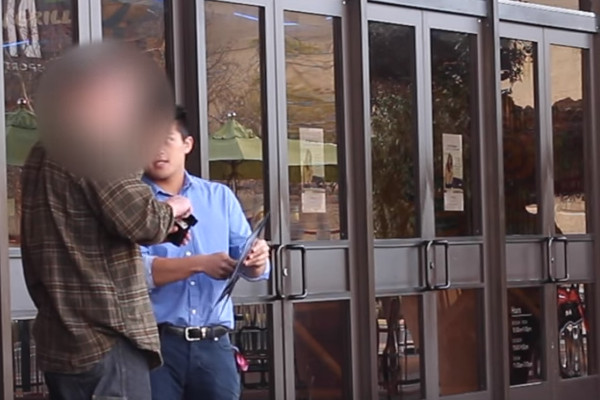
https://www.youtube.com/watch?v=XbqI3yzU3sI
By: Wilson Dizard / AlterNet
Source: AlterNet
Some Americans in San Diego, California are willing and even eager to hand out crescent-shaped badges to their Muslim neighbors, with the promise that Donald Trump’s campaign will pay them $20 dollars per sticker, a social experiment by two San Diego residents found.
San Diego natives Dustin Wynn, 20, a college student interested in film and psychology, and his friend Peteros Mekonnen, 19, a director, wanted to see how hard it would be to get average people to help Trump succeed in his proposal to monitor all Muslims and shut down “radical” mosques by implementing unspecified spying “systems,” as Trump put it.
Wynn called it the “Hitler experiment,” and posted the video on YouTube. The video has grown in popularity comes as attacks against Muslims and mosques have increased since Trump declared that “Islam hates us.” The filmmakers posted the video in January, just a few weeks after the San Bernardino mass shooting, which prompted Trump’s calls for suspending the entry of Muslims into the U.S. Wynn says he modeled the project off the infamous Obedience to Authority experiment in which psychiatrist Stanley Milgram asked subjects to apply electrical shocks to strangers, monitoring them for their susceptibility to political authoritarianism.
“Hello sir, do you want to make some easy money?” Wynn asked pedestrians in San Diego. “I work for the Donald Trump presidential campaign. We’re trying to keep track of all the terrorists in this country.
You just write down the Muslims phone’ number and email address.”
In an exclusive interview, Wynn described the disturbing ease with which he was able to recruit average Americans to hunt down Muslims. “Many people gave me a stink-eye when I said I worked for him, then their hate disappeared when I told them about the money,” he said.
In Wynn’s video, one man who accepted the offer boasted that he knew where he could find Muslims.
“I know a family!” the man replied.
Another character, a mall security guard, told Wynn, “Of course, I was in the Marines. I fought against them.”
Wynn and Mekonnen found that that the regular people they met were not only compelled by offers of cash, but that few who declined the offer attempted to confront them for their bizarre, overtly racist behavior. Only when Wynn started attempting to hand out the stickers to Muslims themselves did he encounter resistance.
“We should be scared for our friends right now,” Wynn told AlterNet.
A second generation Vietnamese immigrant to the United States, Wynn said he undertook the project out of concern for his Muslim friends. He grew up near a community of Somali immigrants and felt Trump’s call for surveillance of Muslims bore a frightening resemblance to fascist incitement against Jews in mid-century Europe.
“I was extremely more nervous to approach Muslims themselves than strangers,” Wynn said. “For obvious reasons, this is because I was directly telling them that they are terrorists. It was very hard. Once I said the word ‘terrorist’ I could barely look at my new Muslim friend in the eye. A very awkward silence would follow.”
Wynn said the request, and the explanation of the experiment, brought one Muslim girl wearing hijab to tears.
“I’m a Muslim and I’m not a terrorist,” she told him on the video. “I’m not wearing this.”
When he told her what he was doing, it turned out they both went to the same high school.
“She was very brave,” he reflected.
Another man on his way out of a mosque understood what was going on immediately.
“Oh so you’re trying to do a Hitler kind of thing?” the man said with a nervous laugh, proceeding to amicably explain how Nazi Germany first tracked, then exterminated, millions of Jewish people. “You should be aware of what you’re doing, too.”
Ibrahim Hooper, spokesman for the Council on American Islamic Relations, a leading Muslim advocacy group, told AlterNet that these experiments “have a wakeup effect for those who are open to rethinking their prejudices, and also expose the existing prejudices in society.”
CAIR and other muslim organizations have said they feel Trump is behind the rise in Islamophobic attacks.
“I think we all might have to just keep our heads down until after the election, and hope that sanity prevails after November,” Hooper said.
But if Trump wins the election, America enters unchartered waters.
“I don’t know what we do at that point,” Hooper said. “You can always hope that Trump was actually lying about his bizarre proposals and anti-Muslim bigotry, and he was only doing it to pander. That will be something we’ll have to figure out after the election.”
For Wynn and Mekonnen, the experience was deeply unsettling. Beyond having many Muslim friends, both young men have families whose lives were affected by political violence or an American military intervention. Wynn’s family came to the United States after the Vietnam war while Mekonnen’s parents grew up amid constant civil unrest in Ethiopia. Both families came to the United States to escape danger and find opportunity. Many Muslim Americans share this experience.
“I definitely do blame Trump,” Wynn said, commenting on the eagerness of those he met to serve as anti-Muslim mercenaries.
“He has used his media attention and platform to bring this issue of Muslims to the front and center of political news. For example, the presidential debates frame the issue as how America will ‘deal’ with Muslims. Trump keeps making [Muslims in America] a problem,” he said.
His co-producer, Mekonnen, was more hopeful.
“I think democracy is an amazing thing,” he said. “And it’s always going to come out the winner in the end.”
Wilson Dizard is a freelance reporter and photographer whose work has appeared at Al Jazeera America and the New York Post.



